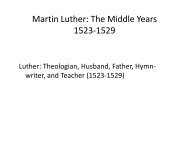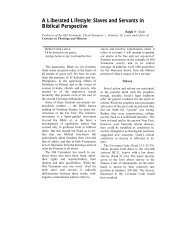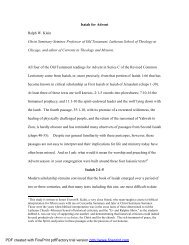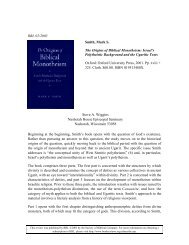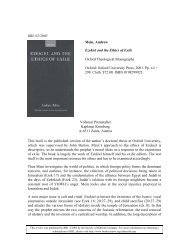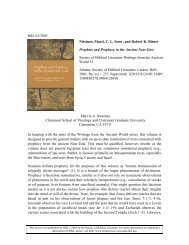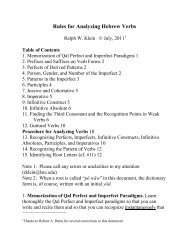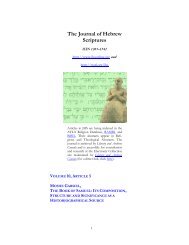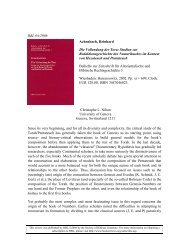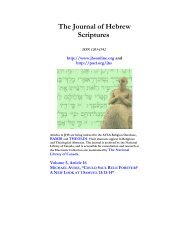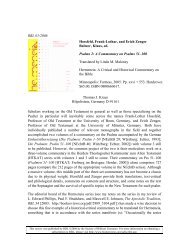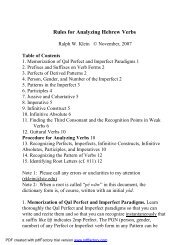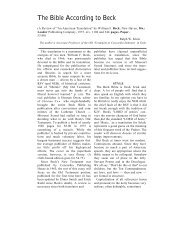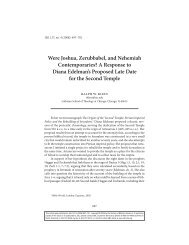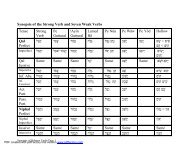“GO, I BEG YOU, TAKE YOUR BELOVED SON AND SLAY HIM ...
“GO, I BEG YOU, TAKE YOUR BELOVED SON AND SLAY HIM ...
“GO, I BEG YOU, TAKE YOUR BELOVED SON AND SLAY HIM ...
Create successful ePaper yourself
Turn your PDF publications into a flip-book with our unique Google optimized e-Paper software.
20 isaac kalimi<br />
him: let us bring forth from him a drop of blood. He said to him: “Do not<br />
do anything (המואמ) to him; do not make a blemish (המומ) in him.”<br />
A more brutal description of Abraham appears in Midrash Hagadol<br />
(ca. 1300–1400 C.E.) on Gen. 22:12:<br />
והלעאו ותוא קונחא םימלועה ןובר ה"בקה ינפל םהרבא רמא—"ךדי חלשת לא"<br />
רמא ,ךינפל םירביא םירביא ונחתנא "!המואמ ול שעת לא" ול רמא .ךינפל הלועל<br />
"!המואמ ול שעת לא" ול<br />
“Lay not your hand upon the lad”—Abraham said to the Holy One<br />
blessed be He: Lord of Heavens, shall I strangle him and bind him as<br />
a burnt offering in front of you. He said to him: “Do not do anything<br />
to him!”—Shall I cut him into pieces for you? He said to him: “Do not<br />
do anything to him!” 60<br />
Despite the obvious view of Scripture and such an interpretation of it<br />
by rabbis, there were others who pushed in extreme directions: some<br />
say that Isaac was injured and bled, and some talk even about the death<br />
and resurrection of Isaac. These views were expressed in different ways<br />
in the halakhic and aggadic sources.<br />
(b) Isaac Was Injured and Bled<br />
The Tannaitic-halakhic Midrash, Mekhilta deRabbi Ishmael (Parashat<br />
Bo 7 [// Parashat Bo 11], on Exod. 12:13; 2nd century C.E.) speaks of<br />
“the blood of the Aqedah of Isaac:”<br />
ארקיו" רמאנש ,קחצי לש ותדקע םד ינא האור—(גי ,בי 'מש) "םדה תא יתיארו"<br />
א"הד) רמוא אוה ןלהלו (די ,בכ 'רב) " 'וגו הארי הוהי אוהה םוקמה םש םהרבא<br />
לש ותדקע םד ?האר המ ," 'וגו הערה לע םחניו הוהי האר תיחשהכו" :(וט ,אכ<br />
. . . .קחצי<br />
60 See M. Margoliot, ed., Midrash Hagadol on the Five Books of Torah ( Jerusalem, 1947),<br />
p. 355 (Hebrew; translation mine). Interestingly, Genesis Rabbah creates an antithetic<br />
picture of the reaction of the angels whose tears reached down earth (for the cries of<br />
angels, see also Pirqe deRabbi Eliezer 31) and the lack of any fatherly mercy from<br />
Abraham’s side. Contrarily, even when God takes back his command, Abraham insists<br />
on sacrificing or at least hurting his son. Do the rabbis criticize or praise Abraham<br />
for being a tough worshiper? Based on the general trends of the rabbinic sources,<br />
presumably the intention is to praise. In contrast to these sources, Gen. Rabbah 56:8<br />
attempts to soften this impression and tells about the fatherly compassion of Abraham<br />
at that moment: ויניעל תועמד תולפונו תועמד תודירומ ויניעו ןיכסה תא לוטיל די חלוש אוה<br />
אבא לש ותונמחרמ קחצי לש (“He stretched forth his hand to take the knife while the<br />
tears streamed from his eyes, and these tears, prompted by a father’s compassion,<br />
dropped into Isaac’s eyes”). However, “Yet even so, his heart rejoiced to obey the<br />
will of his Creator.”



